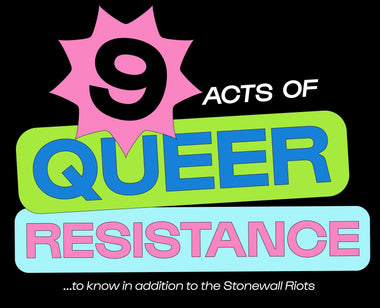Planned Parenthood NYC and the Importance of Queer-Friendly Medical Care


Kate Steinle is the Director of Quality Management and Director of Transgender Health Services at Planned Parenthood of New York City, where she has worked for almost 10 years. Kate works part-time as a clinician in the Brooklyn center, with the rest of her time spent in Clinical Services administration—focusing on the implementation of new clinical services, training and onboarding of new clinicians, and performing clinical services audits. As the Director of Transgender Health Services, Kate initiated the offering of gender-affirming hormone therapy at the Brooklyn health center in 2016 and is continuing to roll out the service to all PPNYC health centers during 2019.
Why is it important to seek out care that specifically concerns LGBTQIA+ identities?
One of the most critical areas we still see harmful gaps in access for queer communities is in health care. Recently, the Trump administration announced a proposal to redefine the Affordable Care Act’s (ACA) 1557 anti-discrimination protections that would remove “gender identity,” effectively gutting transgender protections. The National Center for Transgender Equality (NCTE) says the move could limit health care for 2 million transgender Americans already facing steep hurdles in accessing medical care.

LGBTQ people frequently face discrimination and mistreatment from the medical community. Discrimination in health care settings endangers LGBTQ people’s lives through delays or denials of medically necessary care, due to outdated or unjust laws, insurance coverage denials, barriers encountered at the pharmacy, etc. Stigma is also a critical issue for LGBTQ+ populations that intersects with health care access, like fear of seeking treatment, getting tested, or learning about queer health related to fear of coming out or being discriminated against for their sexuality or gender identity. LGBTQ+ people living outside of major metropolitan areas may also face greater difficulty finding the kind of care they need due to lack of trained providers.
What different types of health care exist for members of LGBTQIA+ community?
LGBTQIA+ patients should have equal and easy access to all types of healthcare—and not just that, but to health care providers who are competent, professional and respectful, and who have clinical expertise in health care concerns specific to the LGBTQIA+ patient population.

At PPNYC, our LGBTQIA+ patients are seen in all of our services—abortion care, sexual and reproductive health services—including GYN care, penile/testicular services, STI screening and treatment, PrEP and PEP, birth control visits, vasectomy, colposcopy, and menopausal hormone care. We also offer gender-affirming hormone therapy for our transgender and gender-expansive patients.
Are these services generally covered by insurance or are they out of pocket?
At Planned Parenthood of New York City, we welcome you regardless of your ability to pay. Services covered varies greatly by the type of insurance you have. However, when you come in for an appointment, we have trained staff who can support you one on one to figure out what your insurance will cover, or to help you get you covered by insurance. We also operate on a sliding-scale model for our patients that are paying out of pocket. No matter what, we’ll figure out a way to get you the care you need and deserve.
What type of training do medical professionals with a focus on LGBTQIA+ health undergo?
Many education programs for medical providers (MDs, PAs, CMs, NPs) do not provide in-depth training on LGBTQAI+ health. Therefore, much of this training has to be sought out by the clinician through attending content-specific conferences or getting on-the-job training. At PPNYC, all of our clinicians undergo a rigorous orientation period. We make sure all of our health center staff are proficient in taking a sexual health history that affirms all sexualities and genders and assesses for risk (for STIs and pregnancy) based on behavior. Through training and observation, we make sure all of our health center staff are creating an environment for our patients that is judgment-free, that presents clinically accurate information in a clear and concise way, and that allows for an open exchange of information and question answering.
Prior to providing any specialized service, including gender affirming hormone therapy, our providers undergo a thorough training program that includes a review of the most up to date medical protocols, multiple days of orientation into the service, attendance at outside conferences, and ongoing support and consultation from the Program Director.

If I’m unable to access a Planned Parenthood, how can I get the care I need from a medical professional who might not focus on LGBTQIA+ health?
In an ideal world, I would feel confident sending my patients to any provider, knowing that they will be treated with respect and kindness and given expert clinical care. However, we do not live in that ideal world, and not only are some health care providers not competent in LGBTQAI+ health, but a few are dismissive or outright hostile. I believe it is my responsibility as a health care provider to make connections with other providers in the area—assess their (and their clinic staff’s) competence in queer health—therefore creating a safe and competent referral network for my patients.
For patients seeking care on their own, I would recommend they ask friends or LGBTQAI+ community members for referrals. We should share these referrals amongst our community to boost up providers who are doing a great job providing affirming care, as well as to hold those accountable who still have work to do to provide the best care to LGBTQAI+ patients. Specifically, I would recommend a patient contact their local queer community center for referrals, look on the Gay Lesbian Medical Association website to find a provider, or other resources like OutCareHealth.org to find a competent provider.
How can I support/advocate for access to LGBTQIA+ health for others?
It’s a critical moment to be supporting sexual and reproductive health and rights in this country, with the widespread attacks on abortion access and Title X funding. Planned Parenthood is often thought of as synonymous with abortion, and that is a service we are proud to provide, but we provide the full range of sexual and reproductive health services. This includes STI testing and treatment, PrEP / PEP, wellness exams, HIV counseling, gender-affirming hormone therapy, birth control, and so much more. To support Planned Parenthood is to support queer communities and stand up for queer health. There are many ways to support us, like by donating or becoming an activist, and you can learn more at www.ppnyc.org.
If you are interested in learning more about queer health, you can also attend the many conferences that are offered across the country, for instance the upcoming Philadelphia Trans Wellness Conference that is open to community members as well as professionals in the health care field, legal services, etc., or the GLMA conference in September. Also, many local queer community centers (like The Center in Manhattan) have programming specific to health care and offer help with insurance enrollment, mental health counseling, substance abuse support networks, and much more.
You can also get out in the streets and show your love and support for transgender and gender non-conforming people by showing up at events like the Trans Day of Action this Friday, June 28.
We need to show up, stand together, and fight. We need to loudly and persistently call attention to the violence that some members of the LGBTQAI+ community face daily, such as the frighteningly high rate of murder among transgender women of color. We need to not stop until everyone in our community feels safe everywhere, is cared for with respect and love, and is offered non-judgemental and expert health care by every provider they encounter.

Latest Articles

A Hot and Quick Guide to BV, UTIs, and Yeast Infections

9 Acts of Queer Resistance to Know in Addition to the Stonewall Riots








